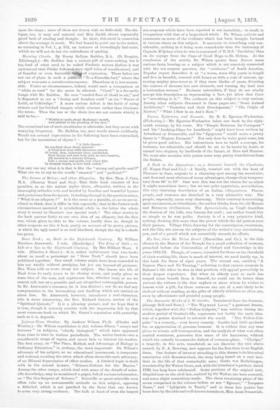The Dramatic Works of W. Goethe. Translated from the German.
(George Boll and Sons.)—" The Wayward Lover," a pastoral drama, which, together with the "Fellow-Culprits," was written during the stugent-peried of Goethe's life, represents but feebly the early blos- som of a genius destined to astonish the world. "The Fellow-Cul- prits " is a comedy,—very heavy comedy. Goethe had little aptitude for, or appreciation of, genuine hnmour. It is seldom that any man given to minute self-introspection, and the analysis of what was often morbid sentiment, possesses this sense of the humorous, without which the comedy becomes the dullest of common-place. " Clavigo," a tragedy, in five acts, translated, as are likewise the two above named, by E. A. Bowring, now appears for the first time in an English dress. One feature of interest attaching to this drama is its historical association with Boanmarchais, the story being based on a real inci- dent in the life of that reniarkable man ; Goetz von Berlichingen, translated by Sir Walter Scott, and, with the translator's preface, dated 1799, has long boon celebrated. Sortie portions of the original text, disquisitions on the civil law, omitted by Sir Walter, are here restored, and some Blight corrections made. The three remaining plays of the seven comprised in the volume before us are "Egmont," " Torquato. Tasso," and " Iphigenia in Tauris," and to these fair justice has been done by the able and well-known translator, Miss Anna Swanwick.


































 Previous page
Previous page